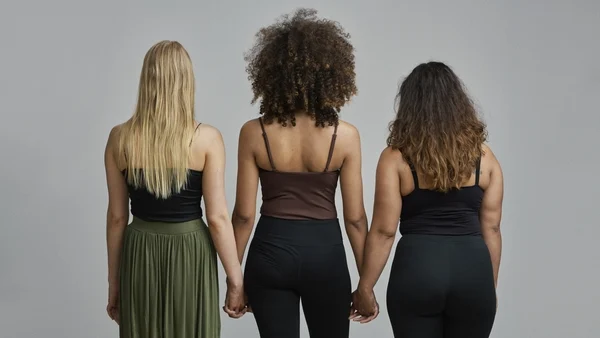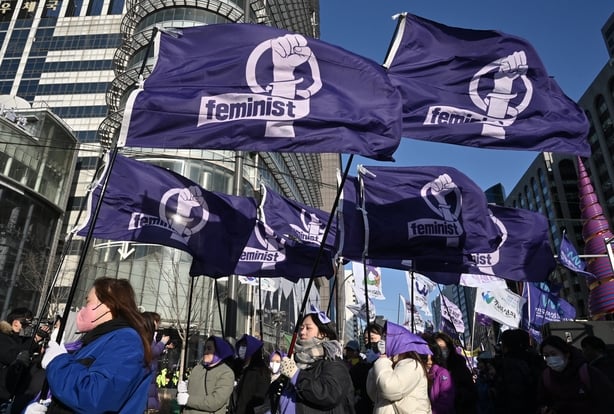Dec 12,2024

Sex educator Dr Caroline West writes about why the concept of "sex strikes", or abstaining from sex with men, has recently become more popularised among some women, and what the historical precedent for such a move is.
In the run up to the US election, sections of social media were flooded with misogynistic commentary, from wanting to repeal the 19th Amendment which gave American women the right to vote, to calls for women to "get back in the kitchen".
In particular, an X post from far-right white nationalist Nick Fuentes that read "Your body, my choice" picked up enormous traction among extremist groups, with analysis from the Institute for Strategic Dialogue showing that mentions of the phrase saw a 4,600% increase on the social media platform.

This trend is not just in America, either: a recent survey by Women's Aid of 1,000 Irish men found that two in five hold 'traditionalist' views. Of these 'traditionalist' men, 70% believe that women's issues are exaggerated.
In response to these attacks on women's rights, healthcare, and safety, the idea of sex strikes or abstinence has arisen again. Movements such as the 4B movement in Korea have emerged as a way to resist this violence against women, but this is not a new approach.
Sex strikes have been noted as far back in time as Grecian times in 400 BC, and even appear in the ancient Greek comedy Lysistrata by Aristophanes, where a group of fed up women pledge to end the Peloponnesian War by refusing to have sex with their warrior husbands until the conflict is ended.
Sex strikes emerged over the course of history, mostly recently as part of the #MeToo movement in the US. Nicaraguan women used the method to protest their enslavement and forced impregnation by Spanish colonists in the 1500s.
Most recently, the 4B movement has come to prominence. Originating in South Korea in the mid 2010s, the four 'b’s in this label stand for the four aims of the movement: women refusing marriage ("bihon"), childbirth ("bichulsan"), dating ("biyeonae") and sex ("bisekseu") with men. "Bi," also means "no" in Korean, tying the movement together under the ‘4B’ moniker.

A sex strike is also an effective way to grab headlines, drawing attention to the general discussion of women's rights and safety. In the #MeToo movement, actress Alyssa Milano called for a sex strike, and while it was ridiculed by many, it was successful in bringing media attention to the issues of rape and harassment.
In Liberia, activist Leymah Gbowee used the call for sex strikes to raise awareness of the Liberia war, in which untold numbers of women and children were raped. Gbowee later won the Nobel Peace prize for her actions, alongside Liberian President Ellen Johnson-Sirleaf and Yemen's Tawakkul Karman, and knew full well her call would not be taken seriously.
She stated: "When someone dares to bring it to the attention of the public, it has two results. People start saying, ‘who’s this person doing this?’ and they start asking why the person is using sex to highlight an issue. And it gets men thinking... They start talking to their colleagues and beer buddies, saying ‘this war is wrong'."
Some of the criticism levelled at the idea of withholding sex for political reasons is centred on the efficiency of the movement. Those who engage in this action most likely are not sleeping with conservative men in the first place, so their actions will not deprive the ones they are intended for.

For those men who view women as mere objects for their use and control, it's possible that they already do not respect when a woman says no, so the women in their lives may be at risk if they attempt to refuse these men sex. Some women will also support convicted rapists and misogynists, and vote against reproductive choice and access, so these women will not engage with this movement.
It may also exclude sex workers, who are not in a position to say no to the income they need to survive and may be some of the most marginalised people in our society. Sex strikes may appear to dismiss the idea that women get pleasure from sex with men and have sex for other reasons than procreation or to just please men. Queer people are also excluded from this movement, reinforcing heteronormative oppression.
We sometimes situate sex as a dangerous activity: morally, physically, and emotionally. A sex strike does not dismantle this framing, because sex is dangerous for many women in many ways. This has led some radical feminists to proclaim that if a woman chooses to have sex with a man, she is colluding with the enemy.
Examples include second wave feminist Sheila Jeffries, who argued that if a woman had an orgasm with a man, she was an active partner in her own oppression. Radical feminist Catherine McKinnon also stated that "all sex, even consensual sex between a married couple, is an act of violence against a woman."
This begs the question: at what point can we really claim our bodies are ours, and at what point are our orgasms ours? Where does pleasure fit in this framing? Can we consent to sex if it is fundamentally an act of violence? Is women’s agency erased in this framing or cemented?

Directly importing another country's approach may not always be successful due to cultural and demographic differences, as British author Tomiwa Owolade highlights in their book, This is Not America: Why Black Lives in Britain Matter, which argues against blindly following other countries examples and advocates for developing the unique strengths and attitudes of our own cultures.
We can certainly learn from other approaches, and address some of the gaps not addressed; for example, the 4B movement in Korean has also been accused of being transphobic, queerphobic, and lacking in diversity.
What may be more successful in the long term is a holistic approach that views sex education as a human right, so that people can empower themselves to understand what sex is, what forms it can take, how to protect themselves, how to reject sex that doesn't serve them, and how to empower all people to find pleasure in whatever form that works for them.
This approach is advocated for by organisations such as the UN, the World Health Organisation, and research shows that it lowers unwanted pregnancies, and increases understanding of consent, power, pleasure, and communication.
To see how this looks in practice, we can look to a group of Black women in the US who have led the way alongside indigenous people in the fight for sexual and reproductive rights. In 1994 in Chicago, a group called Women of African Descent for Reproductive Justice coined the term 'reproductive justice', defining it as the human right to maintain personal bodily autonomy, have children, not have children, and parent the children we have in safe and sustainable communities.
Now known as SisterSong, they advocate for social justice and human rights to be part of the discussion of bodily autonomy, highlighting how race, gender, and intersectionality must be considered in all approaches in the fight for freedom.
Women are not a homogeneous group, and one method of activism will not work for all. However, here we are talking about why these movements exist, just like Leymah Gbowee hoped for.
If you have been affected by issues raised in this story, please visit: www.rte.ie/helplines.
.svg)
